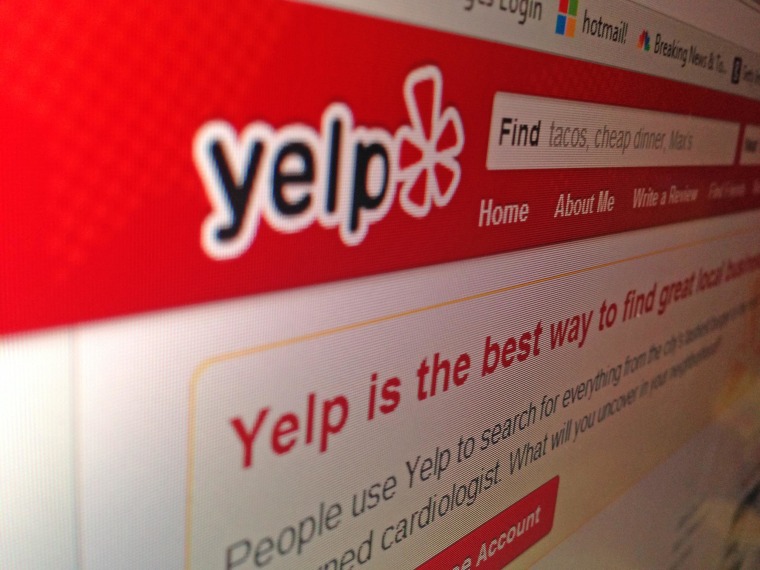User review sites like Yelp and Tripadvisor can be a boon for people looking for a stylish haircut, authentic Thai curry or dog-friendly hotel, but savvy users say it takes a little detective work to keep from being led astray by false kudos or criticisms.
Fake user reviews aren't just a concern for business owners worried about their online reputations — a carpet-cleaning company's lawsuit against Yelp over negative reviews it claims are fake heads to the Virginia Supreme Court this month. It's a problem for would-be patrons too. As user-generated reviews play an increasingly influential role in consumers' decision-making process, buyers of everything from sushi to shoe-repair service have had to figure out ways to sift through the ever-swelling stream of content and determine which reviews they can trust.
“Maybe I’m too trusting,” said Meghan St. John. When the Brooklyn resident read about a lounge with “glowing reviews” on Yelp while looking for a place to go out with her friends, she thought she’d found a winner.
Unfortunately, reality didn’t live up to the hype. “It wasn’t the vibe or the experience we read about in the reviews,” she said. “We ended up leaving the place and going somewhere else.”
Real reviews have a greater prevalence of nouns and adjectives; fakes rely more heavily on verbs and adverbs.
Social and computer scientists at Cornell University studying user-generated online hotel reviews estimate that between 1 percent and 6 percent of positive reviews are fake, and are working on developing software that parses the minutiae of language and subtle markers that indicate deception.
They found a few telltale signs of fake reviews. Real reviews have a greater prevalence of nouns and adjectives; fakes rely more heavily on verbs and adverbs. False positive reviews go overboard with their use of “I,” overcompensating for the fact that they didn’t really experience what they claimed. And since people writing fake reviews haven’t been to the establishments they’re praising or panning, their reviews tend to be light on spatial descriptors.
But while computers are doing a better job flagging fakes, real people still struggle to figure out which commentary is genuine, often just relying on a vague sense that there’s something inauthentic about a review.
“It’s one of those things, you kind of know it when you see it,” said Susan Lawson, a San Diego resident who works for a dental insurance company and uses Yelp for restaurant reviews. “I guess I’m looking for a tone, a vocabulary.”
Negative reviews that veered toward the crass made her suspect a competitor or disgruntled employee might be behind them, she said. “I think if I see something where someone is particularly vulgar or when they’re overly dramatic and using foul language.”
The Cornell researchers found that false negative reviews tended to go overboard with emotional terms like “terrible” or “disappointed” in a way real reviews didn’t.
Conversely, St. John said her experience taught her to be skeptical of over-the-top praise. “Are you going to be that enthusiastic about a simple happy hour drink?”
Both of these hunches are correct. The Cornell researchers found that false negative reviews tended to go overboard with emotional terms like “terrible” or “disappointed” in a way real reviews didn’t. Writers of fake positive reviews displayed the reverse tendency, preferring flowery terms like “elegant” and “luxurious” to a much greater extent than genuine reviewers.
Users of review sites also say reviews that are either too vague or too specific make them suspect fraud.
Vicki Kenyon, who travels frequently for her Chicago-area job at a foodservice distribution company, said she used Tripadvisor to find restaurants and hotels when she visited a new city. “I’m always skeptical of a review that names two or three of the employees in an establishment by name,” she said. “If you mention more than one person, it’s a little over the top for me.”
And when training program consultant Sandy Winters was searching for a new auto mechanic after moving from California to Oregon, she said a lack of detail in some negative reviews made her suspect they might not have been from actual customers. “They weren’t specific about what services they’d had done at that place,” she said. “It seems like they’re very generic.”
“It’s a challenging task,” said Linchi Kwok, assistant professor at the Collins College of Hospitality Management at Cal Poly Pomona. “Go back to the content,” he said. “If there’s no concrete examples … that’s a red flag to me.”
Kwok suggested users of review sites take a look at who’s writing those reviews. A user profile with only a single review and no social connections could be a fraud. He also said leery would-be patrons should look at a place’s reputation on a couple of different review sites. If Yelp offers glowing praise but Tripadvisor and Google Plus reviews are only tepid, that could be suspicious.
After her lounge letdown, St. John said she realized she might have missed some red flags. “I kind of thought back, ‘Hmm, there were only 16 reviews and they were all five-star.’” Now, she said she’s more likely to trust places with a greater number and variety of reviews.
